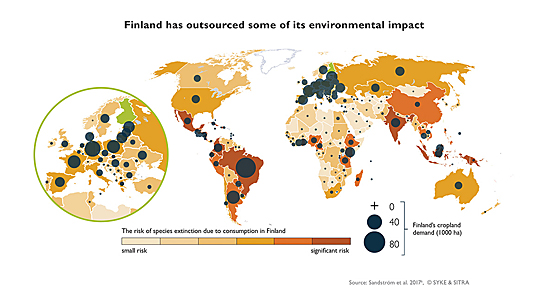Press release 2018-05-30 at 11:28
Finnish Environment Institute and Sitra
The United Nations Agenda 2030 puts binding goals on countries for the promotion of sustainable well-being. However, research indicates that Finland cannot achieve these goals because our ecological sustainability deficit is so great. The change can be achieved only through policy that reduces the consumption of natural resources, secures biodiversity, and sets stricter emission targets. SYKE and Sitra have drafted recommendations for spurring sustainable well-being in Finland in cooperation with researchers at the University of Stockholm and the University of Jyväskylä. These will be presented in the new Policy Brief publication.

The social and ecological sustainability level of the countries of the world. Not a single country has achieved a high level of well-being in an ecologically sustainable manner. Finland is very successful when measured against indicators of social well-being, but its sustainability gap is considerable.
State, municipalities, and private enterprises in a key position
According to researchers all economic activity should be based on a circular economy. Products and their further use should be designed with the efficient re-use of the materials at the end of the life cycle of the product. This requires changes in waste legislation, for example. However, what is most important is to significantly reduce unnecessary consumption of materials.
State and municipal authorities must set tougher goals for reducing emissions and follow their implementation. The use of energy should be reduced through taxation solutions and investments into saving energy. Public investments need to be directed toward carbon neutral solutions for housing and transport.
The activities of every Finnish company must be responsible and transparent and all companies must report on their activities in a transparent manner. Companies should be active in establishing global rules of the game and show leadership through example. Companies can guide both their own activities and those of their cooperative partners in a more sustainable direction, for example by insisting that their subcontractors recycle their materials.
"It is high time to get the goals of sustainable well-being into the core of policy-making. Even of the big change has already begun, the low-carbon society and renewal of energy systems cannot be left to the market alone. The government continues to play a significant role in establishing sustainability in the structures of the welfare state and the economy. For example, gauges are needed alongside GDP to measure environmental impact and human well-being", says Sitra Director Mari Pantsar who took part in drafting the recommendations.
Consumers increasingly want to make more responsible choices. However, they need more information from companies on the environmental and climate footprints of products presented in a way that is easy to absorb. Municipalities also need to ease the sustainability of the everyday lives of their residents.
Municipalities need to move rapidly toward carbon neutrality and to support the well-being and health of local residents, such as the sustainable use of plant-based and locally grown food, incidental exercise, and energy-efficient construction. The state and municipalities would do well to invest in a sufficient level of basic security, education, and participation. These enable change and make it easier to adapt to it. Sustainable well-being also requires social innovations", notes Eeva Furman, Director of the Environmental Policy Centre at SYKE.
Finland has outsourced its environmental impact
Finland is very successful when measured against several indicators of well-being. Long life expectancy, a high level of education, and satisfaction with life have been achieved through all-inclusive social policy and economic growth. However, the success story comes with a price. It endangers the natural system which maintains good human life while eroding the foundation of well-being and the economy.
The impact of Finland also extends around the globe, returning to Finland in the form of phenomena such as flows of refugees and impacts on individual means of livelihood. Not a single country in the world has achieved a high level of well-being in an ecologically sustainable manner. Not even Finland.
"Finnish consumption and production are not sustainable. Consumption in Finland has exceeded the level that is globally just and sustainable, and the same has occurred in other European Union countries as well. Our consumption exceeds all limits of ecological sustainability with the exception of the use of fresh water", says Eeva Furman.

Land area required around the world by foods consumed in Finland. Clearing forest for agricultural use leads to the risk of a loss of species especially in tropical countries. For example, areas where coffee and cocoa are grown have many domestic species that are susceptible to extinction.
Finland has outsourced a significant part of its environmental impact. About 40 percent of agricultural land needed for the production of agricultural products consumed by Finns is outside of Finland, primarily in other parts of Europe and in South America This includes, for example, imported food, coffee, and soybeans. This increases the risk of a loss of species in different countries.
"Respecting the limitations of the earth is a prerequisite for the well-being of humanity. Finland would have a great opportunity to profile itself on an international level as an active player in the building of paths toward sustainable well-being in the same way that we have already done in peacekeeping", says Eeva Furman.
The 25th anniversary celebrations of the National Commission on Sustainable Development are being held today at Finlandia Hall, where the keynote speech will be delivered by Eeva Furman.
Read more:
Further information:
Eeva Furman, director of the Environmental Policy Centre, Finnish Environment Institute SYKE
tel. +358 29 525 1123 , firstname.lastname@ymparisto.fi
Mari Pantsar, Director of the Carbon-neutral circular economy theme at Sitra
tel. +358 29 4618 210, firstname.lastname@sitra.fi
Leena Rantajärvi, Communications specialist, SYKE
tel. +358 5 29 525 1543 , firstname.lastname@ymparisto.fi
Tuula Sjöstedt, Communications specialist, Sitra
tel. +358 50 373 8601, firstname.lastname@sitra.fi